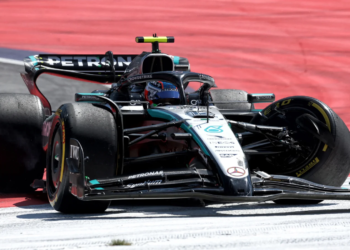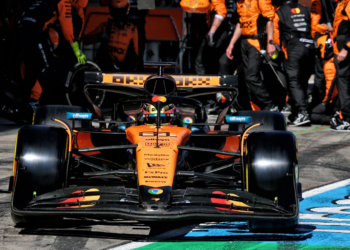Ahead of Formula 1’s Bahrain Grand Prix Motorsport Week looks at some of the key themes to look out for during the 57-lap event.
Can Leclerc convert pole into victory?
Charles Leclerc controlled qualifying to the extent that he looked like a veteran and his relaxed demeanour in the aftermath spoke volumes about his cool personality and focus on what is important: the race. Leclerc is the third driver to have taken his maiden pole position at Sakhir but the previous two to have grabbed the accolade – Robert Kubica (2008) and Valtteri Bottas (2017) – both had to accept the lowest step of the podium on race day. That still wouldn’t be a terrible result for a driver whose best career result so far is the fifth he scored in Australia, but any racer starting from pole position has victory in their sights. If Leclerc can indeed convert pole position into victory then he would, fittingly, join team-mate Sebastian Vettel in triumphing on his second start in red.
Will Ferrari implement team orders?

Ferrari has had a long history of imposing team orders – and this is not a negative element – but this year has given off mixed signals as to its intentions. Pre-season it was indicated that Vettel would be favoured early on but this was hastily clarified, though Leclerc was told to hold station late on in Australia, an instruction that was not entirely surprising nor controversial. There are a lot of ‘ifs’ hanging on the outcome of the race: the start, pit stop strategy, reliability, but given the pace of the Ferrari drivers through the weekend a 1-2 finish would appear the likeliest outcome. Last year at critical junctures Ferrari did not throw sufficient support behind clear leader Vettel (think back to Austria, Germany and Italy) and it was one aspect that contributed to its title defeat. But now with a fast young buck in the other car, does it risk throwing its weight behind Vettel this early in the year, or does it let them duke it out on track?
Can Mercedes muster a challenge?
Mercedes was dominant in Australia but has found itself on the receiving end this weekend – with several members of the team feeling that Ferrari’s pace in Bahrain has justified why the reigning champions were keen to talk down their own chances during testing. But after being substantially off the pace during practice Lewis Hamilton was just 0.030s away from Vettel at the end of Q3, with Valtteri Bottas within a tenth further back. Hamilton conceded Leclerc’s pole time was out of Mercedes’ reach and pointed to Sakhir’s frequent and lengthy straights as the areas where the Silver Arrows are losing time. But that was qualifying – the race is a different kettle of fish. There are now three DRS zones available for use and the changes to the regulations this year means the device is now more effective. Could Mercedes be well placed to profit from DRS and take the fight to Ferrari?
A damage limitation race for Red Bull?

Bahrain has never been the happiest of hunting grounds for either Max Verstappen or Red Bull. The team has not taken a podium at the circuit in the hybrid era while last year both Verstappen and Daniel Ricciardo exited early on. This weekend it has not been in the mix at the sharp end of the grid and has instead been dragged back into the midfield fight. Fifth-placed Max Verstappen edged Haas’ Kevin Magnussen by just 0.005s in Q3 while team-mate Pierre Gasly, Toro Rosso’s hero 12 months ago, fell out in Q2, and was slower than junior team replacement Alexander Albon. Red Bull’s struggles have been more pronounced on Soft tyres which at least gives hope of greater performance on the Mediums in race trim. But if it continues to struggle – not to mention that Gasly has to climb from 13th – then it could be a case of just bagging points and moving on to the next one.
Can Renault salvage points?
Aside from Williams, Renault has been one of the biggest disappointments from the early stages of 2019 as it remains firmly entrenched in the midfield, at odds with its long-term aspirations. Daniel Ricciardo was again knocked out in Q2 – though will start in the top 10 after Romain Grosjean’s penalty – while Nico Hulkenberg fell at the first hurdle amid suspected mapping issues. Renault was disappointed post-Australia and wanted to prove itself in Bahrain, but failing to get either car through to Q3 was a deeply underwhelming result. “I was having to do quite a lot of switch changes during the qualifying laps to try recalibrate it [engine settings],” said Ricciardo. “It was for sure it affected us. On paper it does not look great for us as a team but there certainly some reasons why and it is not as bad as it looks.”

![Lando Norris and Oscar Piastri [McLaren] celebrate their 1-2 finish at the 2025 F1 Austrian GP](https://www.motorsportweek.com/wp-content/uploads/2025/06/Lando-Norris-Oscar-Piastri-McLaren-F1-2025-1-120x86.webp)

![Lando Norris and Oscar Piastri [McLaren] celebrate their 1-2 finish at the 2025 F1 Austrian GP](https://www.motorsportweek.com/wp-content/uploads/2025/06/Lando-Norris-Oscar-Piastri-McLaren-F1-2025-1-350x250.webp)


